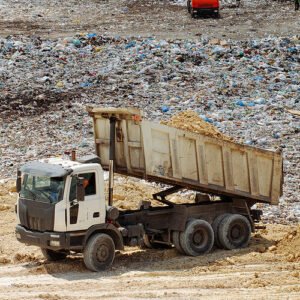As members of the New Hampshire House of Representatives, we’ve seen the House Environment and Agriculture (E&A) Committee spend years working on solid waste reform and landfill siting. Each session, we’ve seen thoughtful, responsible legislation pass the House—only to be weakened or outright rejected in the state Senate. This year, under the leadership of Gov. Ayotte, we believed things could finally change. There was reason for hope.
The governor’s budget took a bold and pragmatic step forward by proposing a one-year moratorium on new landfill siting and the creation of a Landfill Siting Evaluation Committee (LSEC). This committee would be tasked with ensuring that critical factors, such as traffic impacts, public need, and environmental risks, are meaningfully considered before any siting decisions are made.
The House took that framework and strengthened it. We extended the moratorium to three years, allowing time for a more thorough assessment of state needs. We proposed a more inclusive and focused LSEC and added clear, site-specific criteria for the Department of Environmental Services (DES) to follow. These were not radical changes—they were common-sense improvements developed after listening, first and foremost, to the voices of the people in our communities and then all relevant stakeholders, which included the industry—Waste Management (WM), scientists, our conservation commissions, DES, the Governor’s Office, and health and environmental experts.
But rather than meet this effort with collaboration, the Senate chose to scale it back. The Senate proposal shortens the moratorium back to one year, weakens the role and structure of the evaluation committee, and exempts landfill expansions from review altogether. Most concerning of all, it would allow the state to override the will of local communities, prioritizing the interests of private companies over the rights of the people by imposing landfill expansions even when towns object. That’s not just bad policy; it’s a fundamental erosion of New Hampshire citizens’ local voices, something we, as Republicans, have long fought to protect.
Time and again, it appears that the interests of large waste corporations are prioritized over those of Granite Staters. We’ve observed carefully crafted legislation being sidelined or diluted, and many are rightly asking why. It’s no secret that industry voices have a disproportionate influence in some corners of Concord. The fact that Senate legal counsel currently represents one of the largest landfill operators in an active lawsuit against the state and that registered lobbyists tied to the waste industry are also politically active in Senate fundraising raises legitimate questions about fairness and impartiality. These are not accusations—they are facts that should prompt all of us to reflect on whether the public interest is truly being put first.
The people of New Hampshire deserve a solid waste policy that prioritizes their health, communities, and natural resources over the convenience of industry or the expediency of politics. This is not a partisan issue—it’s a matter of public trust.
We still have a chance to get this right. We urge our colleagues in the Senate to return to the table and help us build a responsible and balanced path forward. At a minimum, we should:
- Restore local control. No community should be forced to host a landfill, an expansion, or a project it doesn’t support, and at the same time, also be forced to prove the harms (false until proven true).
- Broaden representation. The siting evaluation committee must include environmental and conservation voices—specifically, a representative from a municipal conservation commission and one from a statewide environmental organization.
- Ensure independent oversight. All siting proposals must undergo third-party review to guarantee objectivity and build public confidence in the process.
To further the governor’s and House’s position, the LSEC language was added to a standalone bill, SB 302, so it would live outside the budget. When WM was asked what they thought about the legislation, a spokesperson stated, “We worked with the House E&A Committee and DES, and they addressed our concerns with the LSEC in the House-passed version of SB 302. WM has had a very good partnership with the City of Rochester, and we don’t want to do anything to undermine that. We plan to continue to work cooperatively with Rochester on future plans for the landfill. Rochester is the host city of the Turnkey Landfill, and we value that relationship.”
Unfortunately, the Senate amendment undermines the governor’s purpose for creating the LSEC, which runs the risk of jeopardizing the good relationship WM speaks about, as many might fear that this new authority could cause WM to bypass local control, which the company has stated it won’t do.
Gov. Ayotte took a commendable first step by putting this issue at the forefront, and our House E&A Committee was beyond grateful and appreciative of this effort. We responded accordingly with solutions grounded in local input, environmental stewardship, human health, and accountability. It’s now time for the Senate to meet that standard and work in the Budget Committee of Conference to deliver the solid waste reform New Hampshire needs.
This opinion piece was written by Republican Rep. Kelley Potenza from Rochester. The following state representatives have also signed on in support:
Rep. Susan DeRoy, R-Strafford 3
Rep. David Walker, R-Strafford 19
Rep. Paul Terry, R-Belknap 7
Rep. Richard Brown, R-Carroll 8
Rep. Sean Durkin, R-Coos 1
Rep. James Tierney, R-Coos 1
Rep. Lori Korzen, R-Coos 7
Rep. Marie Bjelobrk, R-Grafton 5
Rep. Bill Boyd, R-Hillsborough 12
Rep. Catherine Kenny, R-Hillsborough 13
Rep. Diane Kelley, R-Hillsborough 32
Rep. Jose Cambrils, R-Merrimack 4
Rep. Laurence Miner, R-Rockingham 7
Rep. Katelyn Kuttab, R-Rockingham 17




